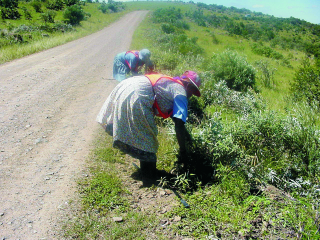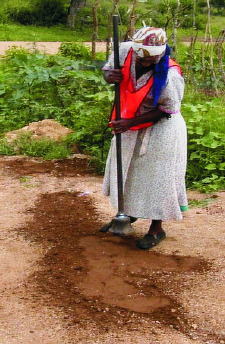|
ZibambeleAn initiative of the KwaZulu-Natal Department of Transport The creation of sustainable job opportunities for poor rural families through the maintenance of rural roads.
The ZIBAMBELE Road Maintenance Contract System is a poverty alleviation programme initiated by the KwaZulu-Natal Department of Transport. This innovative programme which was adapted from the Kenyan Lengthman model, contracts a household rather than an individual to maintain a length of road. ZIBAMBELE contracts stabilize destitute families to break their poverty cycle. The Zulu name given to the "Lengthman" Contract System is ZIBAMBELE, which means "doing it for ourselves'. The name, ZIBAMBELE, captures its unique adaptation to meet the social condition prevailing in rural KwaZulu-Natal.
What is Zibambele?ZIBAMBELE is a routine road maintenance programme using labour intensive methods. It encourages flexible hours on road maintenance activities to allow ZIBAMBELE households adequate time to deploy their labour on other activities. A ZIBAMBELE Contractor is the term used for a person contracted under the ZIBAMBELE programme to maintain a length of road. The length of road allocated to each household depends on the difficulty on the terrain, thus the more difficult the terrain the shorter the allocated road. The contract requires a maximum of 60 hours of work per month to maintain the length of allocated road. A ZIBAMBELE household will:
How the ZIBAMBELE System Works
The selection process brings people together where they can talk about their own and their community's poverty, listen to and advise each other, empathize and work together to ensure that the family selected is the most deserving. The selection process is a traumatic experience for all involved as there are always many more needy families than there are ZIBAMBELE work opportunities. For instance one woman not selected, because she was slightly better off, publicly lamented the fact that her son had recently hanged himself because he could no longer live with hunger. This is by no means an isolated example.
A contract is awarded with equipment, which includes a wheelbarrow, a pick or a hoe, a shovel, a machete and a slasher or a sickle. There is also safety equipment that must be used by contractors at all times whilst working so that they are visible to road users viz. safety vest and plastic cones. The ZIBAMBELE selection process is creating a new king of democracy. More and more communities, including traditional leaders, realize that they are being empowered through ZIBAMBELE. ZIBAMBELE has brought hope to families who look forward to joining savings clubs and becoming more economically viable. In almost all instances, this will be the first time that these families are able to save money.
A Zibambele contractor compacts gravel using a hand-rammer.
"In 1999 the KwaZulu-Natal Department of Transport piloted the ZIBAMBELE System by awarding 2 700 contracts as part of its Road to Wealth and Job Creation initiative. The Road to Wealth and Job Creation initiative was presented at the Jobs Summit in October 1998. The initiative highlights the important role that road infrastructure plays in placing the rural economy on a growth path that absorbs labour. Road construction projects and maintenance programmes can be designed to create work opportunities from the most unemployable to the most professional. ZIBAMBELE has been implemented in KwaZulu-Natal to provide work opportunities for the ultra poor. The selection process of ZIBAMBELE unmasks hidden levels of grinding poverty that are truly shocking. We in KwaZulu-Natal are reminded once again of the terrible legacy inherited from apartheid and from decades of civil conflict, which has widowed thousands upon thousands of women leaving them destitute. I appeal to the donor community and the public to support ZIBAMBELE
and help government to create real opportunities for poor families. We have a
target of 40 000 ZIBAMBELE contracts which can only be achieved with
your assistance.” Mr J S Ndebele, Premier of KwaZulu-Natal (2004-) and former
MEC for Transport (1994-2004).
|

